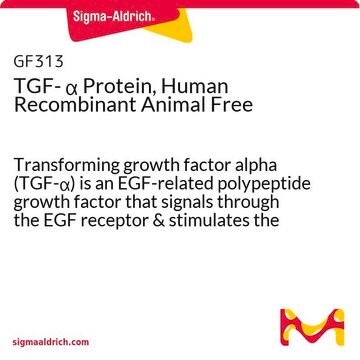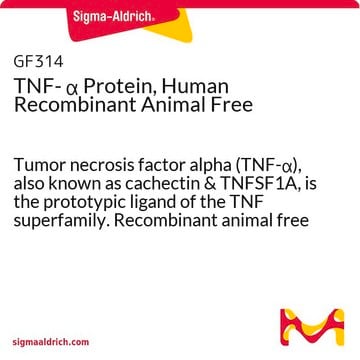H8541
Fator de crescimento transformador-β1
≥95% (SDS-PAGE), recombinant, expressed in HEK 293 cells, lyophilized powder, suitable for cell culture
Sinônimo(s):
TGF-β1
About This Item
Produtos recomendados
Nome do produto
Fator de crescimento transformador-β1, TGF-β1, Xeno-free, recombinant, expressed in HEK 293 cells, suitable for cell culture
fonte biológica
human
Nível de qualidade
recombinante
expressed in HEK 293 cells
Ensaio
≥95% (SDS-PAGE)
Formulário
lyophilized powder
potência
≤0.5 ng/mL EC50
qualidade
endotoxin tested
peso molecular
dimer 25 kDa (non-glycosylated)
embalagem
pkg of 5 μg
condição de armazenamento
avoid repeated freeze/thaw cycles
técnica(s)
cell culture | mammalian: suitable
Impurezas
≤1 EU/μg
nº de adesão UniProt
temperatura de armazenamento
-10 to -25°C
Informações sobre genes
human ... TGFB1(7040)
Procurando produtos similares? Visita Guia de comparação de produtos
Descrição geral
Aplicação
- to study the expression of PDGFRB (Platelet derived growth factor receptor β) in association with transforming growth factor-β signaling.[4]
- to stimulate lung fibrosis in human fetal lung fibroblast cell line in order to further measure the in-plane elasticity of live cell layers using a pressure sensor embedded microfluidic device.[5]
- to study the effect of TGF-β on HTRA1 (high-temperature requirement A1)-affected Wnt target genes.[6]
Ações bioquímicas/fisiológicas
forma física
Nota de análise
Palavra indicadora
Danger
Frases de perigo
Declarações de precaução
Classificações de perigo
Eye Dam. 1 - Skin Corr. 1B
Código de classe de armazenamento
8A - Combustible corrosive hazardous materials
Classe de risco de água (WGK)
WGK 2
Ponto de fulgor (°F)
Not applicable
Ponto de fulgor (°C)
Not applicable
Escolha uma das versões mais recentes:
Certificados de análise (COA)
Não está vendo a versão correta?
Se precisar de uma versão específica, você pode procurar um certificado específico pelo número do lote ou da remessa.
Já possui este produto?
Encontre a documentação dos produtos que você adquiriu recentemente na biblioteca de documentos.
Os clientes também visualizaram
Artigos
Discover answers to your frequently asked questions about animal component-free, xenobiotic-free, and chemically defined media and reagents for cell culture.
Conteúdo relacionado
Discover cancer research resources with modeling and profiling tools for cell culture, genomics, biomarkers, and more to help maximize your cancer research.
Active Filters
Nossa equipe de cientistas tem experiência em todas as áreas de pesquisa, incluindo Life Sciences, ciência de materiais, síntese química, cromatografia, química analítica e muitas outras.
Entre em contato com a assistência técnica










